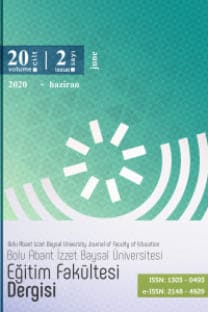ARGÜMANTASYON TABANLI BİLİM ÖĞRENME YAKLAŞIMININ ORTAOKUL ÖĞRENCİLERİNİN KAVRAMSAL ANLAMALARINA VE FENDEKİ GÖSTERİMLERİ KULLANMAYLA İLGİLİ GÖRÜŞLERİNE ETKİSİ
Bu çalışmada, argümantasyon tabanlı bilim öğrenme (ATBÖ) yaklaşımının ortaokul 6. sınıf öğrencilerinin maddenin tanecikli yapısı ünitesindeki konulara yönelik kavramsal anlamalarına ve öğrencilerin fendeki gösterimleri kullanmayla ilgili görüşlerine etkisi incelenmiştir. Basit deneysel yöntemin uygulandığı çalışmaya 37 öğrenci katılmıştır. Çalışmada veri toplama araçları olarak iki aşamalı kavram başarı testi ve gösterim anketi kullanılmıştır. Kavram başarı testi ve gösterim anketinden elde edilen veriler ilişkili örneklem t testi kullanılarak analiz edilirken, erkek ve kız öğrencilerin kavram başarı testi ve gösterim anketinden elde edilen sonuçları için ANCOVA yapılmıştır. Çalışma sonucunda, öğrencilerin kavramsal başarıları ve gösterimle ilgili görüşleri son test lehine istatistiksel olarak anlamlı bir farklılık göstermiştir. Kız ve erkek öğrencilerin ön ve son test kavramsal başarıları ve gösterimle ilgili görüşleri incelendiğinde, ön testlerde kız öğrenciler lehine anlamlı bir farklılık bulunurken, son testlerde cinsiyetler açısından istatistiksel olarak anlamlı bir farklılık bulunmamıştır. Ayrıca, birden çok gösterim kullandıklarında bilgileri daha iyi öğrendikleri ve daha kolay hatırladıkları, fikirleri daha etkili bir şekilde organize ettikleri için öğrencilerin çoklu gösterimleri kullanmayı tercih ettikleri ortaya çıkmıştır. Aynı zamanda çoklu gösterimlerin fikirlerin daha doğru iletilmesine ve başkaları tarafından anlaşılmasına yardımcı olduğu için öğrenciler tarafından tercih edildiği belirlenmiştir.
Anahtar Kelimeler:
Argümantasyon tabanlı bilim öğrenme (ATBÖ) yaklaşımı;, gösterim, ;kavramsal anlama
___
- Burke, K. A., Greenbowe, T. J. & Hand, B. M. (2005). Excerpts from the process of using inquiry and the science writing heuristic. Retrieved from http://avogadro.chem.iastate.edu/SWH/Resources.htm.Cavagnetto, A. R., & Hand, B. (2012). The importance of embedding argument within science classrooms. In M. S. S. Khine (Ed.), Perspectives on scientific argumentation (pp. 39–53). Dordrecht, the Netherlands: Springer.Chen, Y.-C., Park, S. & Hand, B. (2016). Examining the use of talk and writing for students’ development of scientific knowledge through constructing and critiquing arguments. Cognition and Instruction, 34(2), 100–147.Chen, Y.-C., Hand, B., & McDowell, L. (2013). The effects of writing-to-learn activities on elementary students' conceptual understanding: Learning about force and motion through writing to older peers. Science Education, 97(5), 745–771.Choi, A., Hand, B., & Greenbowe, T. (2013). Students' written arguments in general chemistry laboratory investigations. Research in Science Education, 43(5), 1763–1783.Cohen, L., Manion, L., & Morrison, K. (2007). Research methods in education. Oxon, UK: Routledge.Gunel, M., Kabatas-Memis, E. & Buyukkasap, E. (2010). Effects of the science writing heuristic approach on primary school students’ science achievement and attitude toward science course. Education in Science, 35(155), 49–62.Hand, B, Park, S, Kyung Suh, J & Bae, Y (2017a). Teacher Orientation as a Critical Factor in Promoting Science Literacy, European Science Education Research association ESERA, dublin City University, Dublin, Ireland, 21-25 August.Hand, B., Norton-Meier, L., Jang, J. (Eds.) (2017b). More voices from the classroom: International teachers' experience with Argument-Based Inquiry. Rotterdam: Sense Publishers. Hand, B., Shelley, M. C, Laugerman, M., Fostvedt, L., & Therrien W. (2018) Improving critical thinking growth for disadvantaged groups within elementary school science: A randomized controlled trial using the ScienceWriting Heuristic approach. Science Education. 1–18. https://doi.org/10.1002/sce.21341. Hand, B., Wallace, C. W. & Yang, E. (2004). Using a science writing heuristic to enhance learning outcomes from laboratory activities in seventh-grade science: Quantitative and qualitative aspects. International Journal of Science Education, 26(2), 131–149.Hand, B & Keys, CW. (1999). Inquiry investigation: a new approach to laboratory reports. The Science Teacher, 66(4): 27–29.Hohenshell, M. L. & Hand, B., (2006). Writing-to-learn strategies in secondary school cell biology: A mixed method study. International Journal of Science Education. 28(2), 261-289. Jang, J. & Hand, B. (2017). Examining the Value of a Scaffolded Critique Framework to Promote Argumentative and Explanatory Writings Within an Argument-Based Inquiry Approach. Research in Science Education 47 (6), 1213-1231.Kıngır, S., Geban, Ö., & Günel, M. (2013). Using the science writing heuristic approach to enhance student understanding in chemical change and mixture. Research in Science Education, 43, 1645–1663.Lamb, R. L., Hand, B. M. & Yoon, S. (2017). Examinations of cognitive processing of science writing tasks. Journal of Psychology and Brain Studies, 1, 1-5.McDermott, M. A. & Hand, B. (2010). A secondary reanalysis of student perceptions while participating in nontraditional writing in science. Journal of Research in Science Teaching, 47(5), 518–539.McDermott, M. A., & Hand, B. (2013). The impact of embedding multiple modes of representation within writing tasks on high school students' chemistry understanding. Instructional Science, 41, 217-246.Midgette, E., Haria, P., & MacArthur, C. (2008). The effects of content and audience awareness goals for revision on the persuasive essays of fifth and eighth-grade students. Reading and Writing, 21(2), 131 – 51.NGSS Lead States. (2012). Next Generation Science Standards: For states, by states. Washington, DC: The National Academies Press.Norris, S. P., & Phillips, L. M. (2003). How literacy in its fundamental sense is central to scientific literacy. Science Education, 87(2), 224–240.Sadler, T. D. (2009). Situated learning in science education: Socioscientific issues as contexts for practice. Studies in Science Education, 45(1), 1–42.Seo, K. (2016). Representation as a language of scientific practice: exploring students’ views on the use of representation and the linkage to understanding of scientific models. (Unpublished doctoral dissertation). The University of Iowa, IA, USA.Treagust, D. F. (1988). Development and use of diagnostic tests to evaluate students’ misconceptions in science. International Journal of Science Education, 10(2), 159-169. Trochim, W. M. (1999) The research methods knowledge base, 2nd edn. Atomic Dog, CincinnatiWalton, D (2016). Argument evaluation and evidence. The Netherlands: Springer.
- ISSN: 1303-0493
- Yayın Aralığı: Yılda 4 Sayı
- Başlangıç: 2000
- Yayıncı: Abant İzzet Baysal Üniversitesi Eğitim Fakültesi
Sayıdaki Diğer Makaleler
İSTENMEYEN ÖĞRETMEN DAVRANIŞLARINA İLİŞKİN ÖĞRETMEN ADAYLARININ GÖRÜŞLERİ
Seyit ATEŞ, Ezgi ÇETİNKAYA ÖZDEMİR, Ahu TANERİ
BİR ÖĞRETMENLİK UYGULAMASI SÜRECİNİN FARKLI KATILIMCILAR TARAFINDAN DEĞERLENDİRİLMESİ
Hakan Şevki AYVACI, Dilek ÖZBEK, Sinan BÜLBÜL
Elif SAYGI, Çiğdem ALKAŞ ULUSOY
YÖNETİCİ VE ÖĞRETMEN GÖRÜŞLERİNE GÖRE GÖÇMEN ÇOCUKLARIN EĞİTİM SORUNLARI VE ÇÖZÜM ÖNERİLERİ
